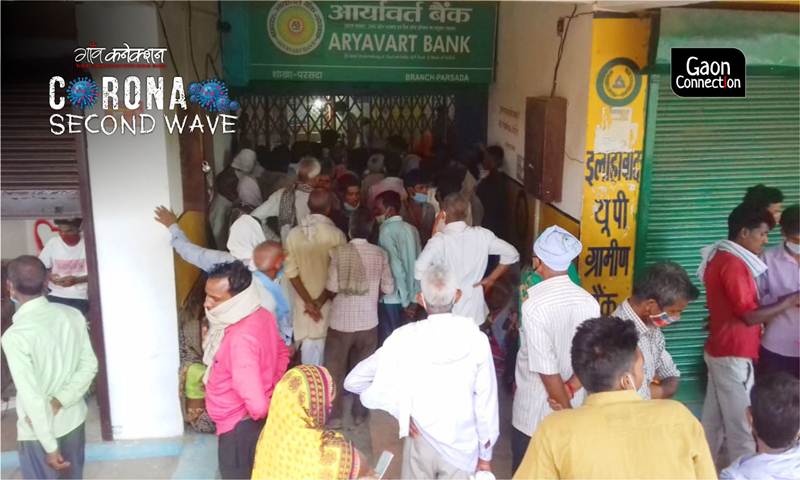Sanjeev Patel serves as a branch manager at a rural bank. Since May 15, he is working in a constant grip of anxiety as crowds visit the bank to withdraw with no regard for COVID19 protocols.
On May 14, Prime Minister Narendra Modi released the eighth instalment of Pradhan Mantri Kisan Samman Nidhi Yojana (PM Kisan Yojana). Since then, farmers in rural areas have rushed to banks to withdraw their grant of Rs 2,000 directly credited into their accounts by the central government.
Patel’s Aryavart Gramin Bank in Mainpuri district’s Bichwa in Uttar Pradesh is also receiving beneficiary farmers in droves.
“These are the most difficult days that I have ever seen in my banking career. We can’t even say no to these needy people,” the 38-year-old told Gaon Connection.
प्रधानमंत्री जी द्वारा किसान सम्मान निधि की आठवीं किस्त जारी, देखो भुगतान के लिए बैंकों में मची है कैसी मारा मारी, बिना टीकाकरण और सुरक्षा के संक्रमित हो रहे बैंक कर्मचारी, लोकप्रियता तुम्हारी खतरे में जान हमारी @Bankers_We@rti_we @ppbajpai @ndtv @DFS_India pic.twitter.com/iAE4ZPa8nH
— Kamlesh Chaturvedi (@Kchaturvedi6756) May 17, 2021
“But it is fearsome to see them crowding here without masks and physical distancing. I feel a helpless fear while going back home to my family, afraid that I might possibly infect them. There are three employees at the bank, all are below 45 years of age and aren’t vaccinated,” he added.
Also Read: ‘No vaccination, no sanitisation— yet, we bank employees are called Corona warriors’
Patel told Gaon Connection that since May 15, at least 400 farmers have been coming to the bank daily. “Half of them are here for the withdrawal of PM Kisan Nidhi allowance. We have a police station nearby so we get some support from the cops to control the crowds but uncontrolled crowds are a common sight in many other local banks,” he added.
Similar scenes are being witnessed elsewhere in the country. Twenty-nine-year-old Sanjeev Kumar Dalvai works as a branch manager in Andhra Pradesh’s Vijaynagar, about 450 kilometres from the state capital Amaravati.
“Earlier 70-80 people used to visit the banks but now more than 150 people are coming every day to withdraw their allowances under PM Kisan Nidhi,” Dalvai told Gaon Connection. “Neither people wear masks nor believe in Corona. Many of my colleagues are infected by COVID19. Just two people are presently operating the branch,” he added.
PM-Kisan Scheme
Almost 95 million farmers across the country are estimated to be benefitted from the central government’s scheme in this installment released recently.
The PM-Kisan scheme, which was launched on February 1, 2019, provides Rs 6,000 in three installments to almost 140 million farmers annually. The amount is directly transferred into the bank accounts of the beneficiaries through direct benefit transfer (DBT) mode.
The desperation of the crowds that have thronged the banks to collect their installment of PM Kisan Nidhi scheme is intensified due to the difficulties that have risen as a consequence of the COVID19 pandemic’s second wave, loss of livelihoods and the reverse migration of migrant workers.
“The bank management is not really at fault. Bank workers have been provided with masks and face covers (face shields) but all precautionary measures go for a toss when 300-400 people pack themselves inside the banks. The banks will soon prove to be ‘Corona bombs’ in the rural areas,” Chennai-based Bholendra Pratap Singh, Secretary, All India Regional Rural Bank Officers’s Federation (AIRRBOF), told Gaon Connection.
Also Read: PM-Kisan scheme – Over 80% of nearly 10 crore registered farmers got the promised money
According to the data provided by the Indian Bank Officers Federation, there are almost a million bank employees in the public sector banks and the regional banks in the rural areas.
On March 28, the Parliamentary Standing Committee on Home Affairs on Management of Covid Pandemic had lauded the efforts of bank employees. “The committee notes and appreciates the efforts and pain taken by the banking sector for providing uninterrupted and seamless banking facilities during the Covid-19 outbreak and the consequent lockdown… In their sincere effort to provide continuous service, many of the bank officials also lost their valuable life,” the committee had said in its report.
But the ground reality differs from the standing committee’s note of appreciation.
Corona warriors on paper
“The government has declared us Corona warriors, but that has made no difference to our lives. Both we and customers coming to the bank are not safe,” said Santosh Tiwari, branch manager of Baroda UP Gramin Bank in Uttar Pradesh’s Bareilly district. “Bank employees must be vaccinated on a priority basis and banks must be sanitised, but nothing has been done,” he added.
Also Read: 50% drop in COVID19 vaccination in India in the past month, shows govt’s Co-WIN data
The bank employees demand that they should be vaccinated against COVID19 on priority basis and should be entitled to a life insurance of Rs 5 million each.
“Last year, the rural citizens queued up to avail their entitlements for welfare schemes like Ujjawala. And there was no Corona in the rural areas last year. But this year it’s different. The COVID19 is raging in the villages. Despite being hailed as frontline workers, we are not being preferred for vaccination,” the AIRRBOF secretary added.
“After a long struggle with the management, Aryavart Gramin Bank has now provided a life insurance cover of twenty lakh rupees (Rs 2 million) for its bank employees. But we demand for it to be raised to fifty lakh (Rs 5 million),” he added.
The AIRRBOF has appealed to the government and the local district administration to allot a certain day for a group of beneficiaries in a bid to reduce the number of people coming to banks. Also, it has proposed a token system in which a fixed number of tokens will be distributed to the people on a ‘first come first serve’ basis.


















